Americans are uncertain how the Israel-Hamas war might change the Middle East. Many are unsure whether the war will increase or decrease the likelihood of an independent Palestinian state, as well as whether the current fighting will make the Israeli people safer.
In addition, a sizable share of U.S adults are unsure what is the best possible outcome to the long-running conflict between Israelis and Palestinians. A “two-state solution” – in which an independent Palestinian state would emerge, over time, side-by-side with Israel – has been the stated goal of the U.S. government under both Republican and Democratic administrations. That vision still garners more public support than any of the “one state” alternatives – a single state under a Palestinian government, a single state under an Israeli government, or a single state with shared leadership. But the survey finds that support for a two-state solution has been growing more politically polarized.
Amid all this uncertainty, one point of general agreement is that a durable peace is not likely to emerge from the war. Many Americans think it is unlikely there will eventually be peace between Israelis and Palestinians.
As with most issues related to the war, there are differences in opinion between U.S. religious groups, as well as between people of different ages and political leanings, on the likely consequences of the war. This chapter examines those differences.
What the Israel-Hamas war means for a Palestinian state
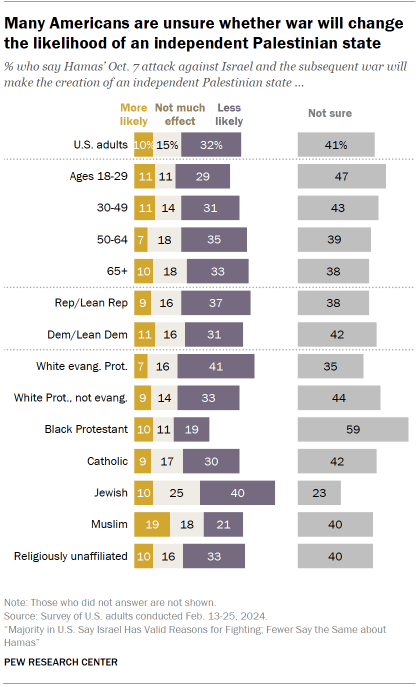
When it comes to what Hamas’ Oct. 7 attack and the subsequent war with Israel mean for the creation of a Palestinian state, 41% of Americans are unsure. An additional 15% think it will have little effect on the chances for an independent Palestinian state.
Among Americans who think the current fighting will make a difference, far more say it will make the creation of a Palestinian state less likely (32%) than that it will make this more likely (10%).
Age
Younger Americans differ little in their estimations from older adults, though older adults are slightly more likely to think the current conflict will not have much effect (18% vs. 11%). Younger adults are more unsure.
Party
Partisan differences are also relatively modest, with Republicans and Republican-leaning independents slightly more likely than Democrats and independents who lean toward the Democratic Party to think the current conflict will decrease the chances of an independent Palestinian state (37% vs. 31%).
Religion
American Muslims share the larger public’s uncertainty about the long-term effect of the current round of violence, with 18% saying the war will not have much effect on the prospects for a Palestinian state and an additional 40% saying they are unsure. Still, Muslims are somewhat more likely than other U.S. religious groups to say the war will increase the chances of the emergence of an independent Palestinian state (19%).
Jewish Americans are among the most likely of the religious and nonreligious groups analyzed to say that the creation of a Palestinian state is less likely now than it was before the war (40%). Only 10% of Jews think an independent Palestinian state is now more likely, with the rest saying the war will not have much effect (25%) or that they are unsure what effect it will have (23%). White evangelical Protestants (41%) also stand out for the large share who see a Palestinian state as less likely now.
What the war means for Israeli security
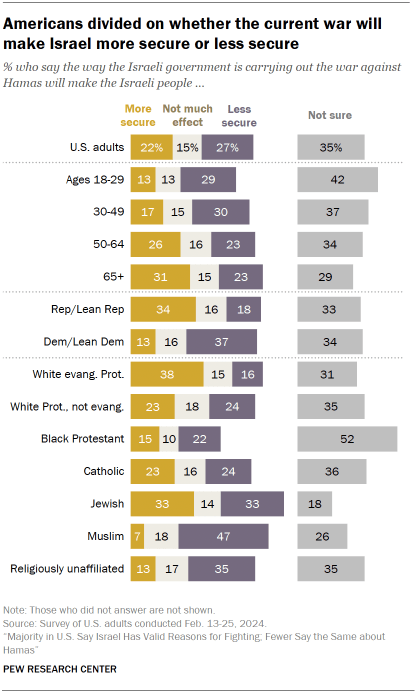
Americans are divided over whether the Israeli people will be made more secure (22%) or less secure (27%) by the way the Israeli government is carrying out the war against Hamas. An additional 15% don’t think the conduct of the war will have much effect on Israeli security, and 35% are unsure.
Age
By a margin of more than 2-1, adults under 30 say the way Israel’s government is carrying out the war will make the Israeli people less secure (29%) rather than more secure (13%). But about four-in-ten young adults are unsure.
Among Americans ages 65 and older, the balance of opinion is flipped: More think the war will increase Israeli security than harm it (31% vs. 23%). But roughly three-in-ten of these older Americans are unsure.
Party
About a third of both Republicans and Democrats are unsure what impact the war will have on Israeli security. However, among Republicans who think the current conflict will make a difference, more think it will make the Israeli people safer rather than less safe (34% vs. 18%). The reverse is true among Democrats, with 37% saying the way the Israeli government is carrying out the war against Hamas will make the Israeli people less secure, and 13% saying it will make them more secure.
Religion
Among religious groups, White evangelical Protestants stand out as the group most likely to say the way the Israeli government is carrying out the war will make the Israeli people more secure (38%). Other Christian groups, such as White nonevangelical Protestants and Catholics are divided, as are Jews.
Among Muslims, by far the most common view is that the Israeli government’s conduct of the war will make the Israeli people less secure. Nearly half of U.S. Muslim adults (47%) take this view.
Peace between Israelis and Palestinians
Few Americans are optimistic that there will eventually be peace between Israelis and Palestinians. Only 3% of U.S. adults say this is extremely or very likely. Another 9% say it is somewhat likely, while around two-thirds say peace is either not too or not at all likely. People across all age groups are about equally likely to say peace is likely, though younger people are somewhat more likely to say they are unsure. Political and religious differences are also muted.
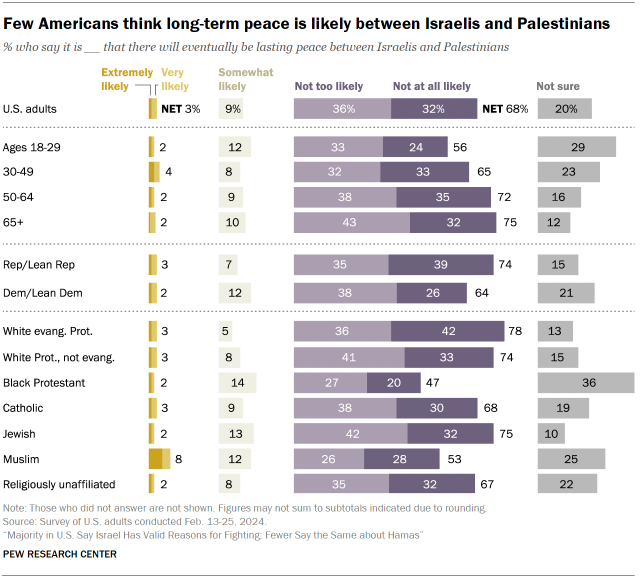
4 in 10 Americans say the land should be divided into 2 states, but many are unsure
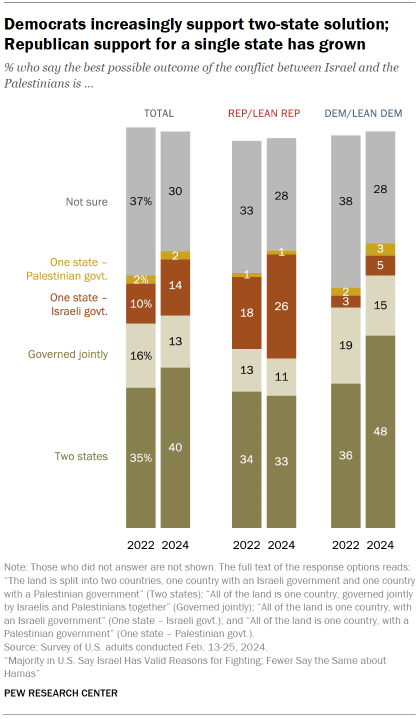
When asked what they think would be the best possible outcome of the long-running conflict between Israel and the Palestinians, a plurality of adults (40%) say the land should be split into two countries, one with an Israeli government and one with a Palestinian government. This vision has long been endorsed by the U.S. government. Many Americans who do not hold this view are unsure what would be the best outcome (30%).
Smaller shares believe that all the land should be a single country governed jointly (13%), or a single country with an Israeli government (14%). A very small share of the public (2%) says the best possible outcome for the conflict would be a single country with a Palestinian government.
Support for a two-state solution has gone up very slightly since the question was last asked in 2022, as has support for a single country with an Israeli government. In part, this reflects a shrinking share of respondents who say they aren’t sure what is the best possible outcome.
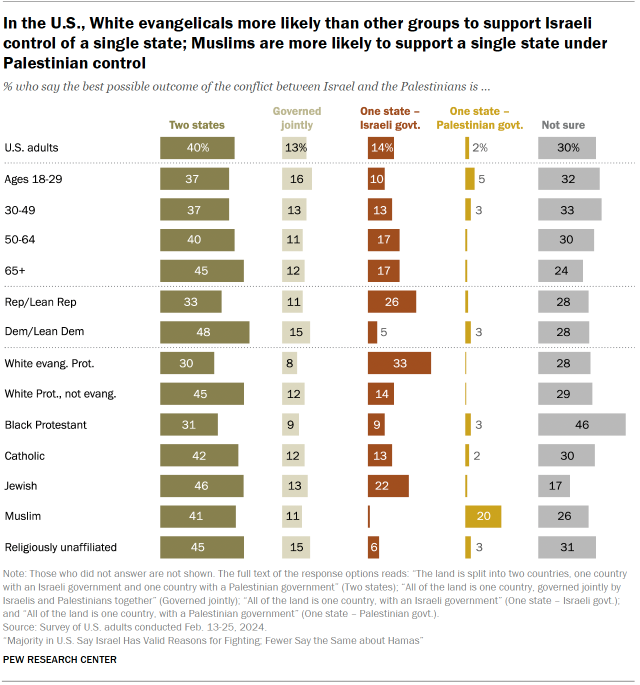
Age
Across age groups, the most common view is that the best possible outcome of the conflict between Israelis and Palestinians is two states – one with an Israeli government and one with a Palestinian government.
However, younger adults are somewhat more likely that older Americans to say they are not sure what the ideal resolution would be, while older adults are somewhat more likely than younger ones to say the best outcome would be to split the contested land into two countries or to have a single country, with an Israeli government, control all the land.
Party
Roughly half of Democrats say that the best possible outcome would be a two-state solution, while a third of Republicans agree. Republicans are much more likely than Democrats to say that the best possible solution would be a single country with an Israeli government.
This partisan gap in views of the two-state solution reflects an increase in support for a two-state solution among Democrats in recent years. In 2022, Republicans and Democrats were about equally likely to say the best possible outcome would be two independent states, one Israeli and one Palestinian. Over the same period, support has risen among Republicans for a single state governed by Israelis (26% in 2024, up from 18% in 2022).
Religion
Across religious groups there is some disagreement on what would be the best possible outcome.
Of the groups large enough to be analyzed, White evangelical Protestants (33%) are the most inclined to say the land should be one country with an Israeli government. More than twice as many Jewish Americans say the land should be split into two states (46%) than say it should all be governed by Israel (22%).
Muslim Americans stand out as well. Although the most common response among Muslims is support for a two-state solution (41%), they are the only group in which a substantial minority says the ideal solution would be a single country with a Palestinian government (20%).




